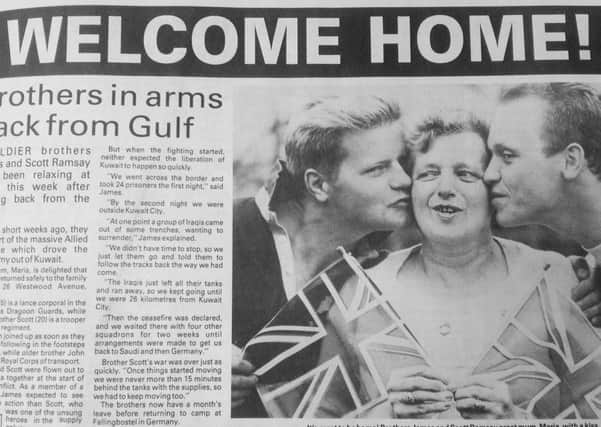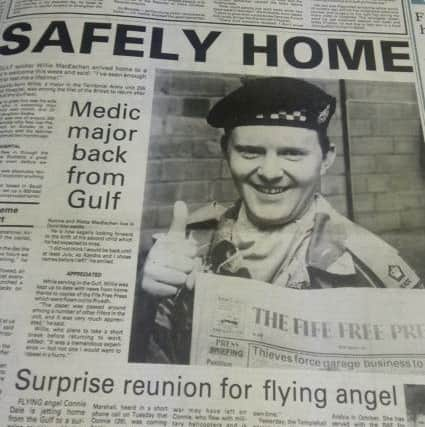How Desert Storm made an impact back home in Fife


A new year dawned with Iraq’s invasion of Kuwait sparking an international response.
January 16 saw US President George H.W. Bush signal a major military operation which led to troops from the United Nations sent in to protect the Saudi Arabian border.
Advertisement
Hide AdAdvertisement
Hide AdThey featured many serving personnel from Fife, leaving behind worried families who prayed for their safe return.


Within two days.
The Victoria Hospital in Kirkcaldy was on alert to receive possible casualties as the first enemy targets were blitzed with waves of allied bombers.
Health bosses had spent months in discussions to ensure they had a plan ready to implement as the Vic was selected as a second line hospital – meaning it would accept war wounded who had been treated in battlefield centres before being returned to the UK.
The Fife Free Press also reported that social work teams had been briefed on how to counsel traumatised troops and their families, and Fife Regional Council confirmed it had a disaster plan ready to roll if the Vic became a Scottish centre for the war wounded.
Advertisement
Hide AdAdvertisement
Hide AdLocal folk also mobilised. Stuart Henderson set up one of the first support groups for Fife families – his own son, Andrew, was sent to the Gulf – and its numbers doubled after its first meeting.
More blood donors than ever also rolled up their sleeves to make a donation at Viewforth High School, and the local Red Cross launched an initiative to send parcels to the troops.
Stories capturing the drama – and horror – of war quickly filtered back to town as nurses at the Vic said they would work for free to tend to any wounded service personnel.
Kinghorn teacher Beth Stirling spoke of sheltering in fear as Iraq’s Scud missiles rained down on Tel Aviv, killing civilians. She had worked in the area for two years with the Church of Scotland’s Tabeetha School.
Advertisement
Hide AdAdvertisement
Hide Ad“My heart leaps every time there is an air raid alert. I have never been so frightened,” she said.
Prayers were also said for a young medic, Lance Bombardier Colin Walker, who flew to the battle zone just one month after his wedding, while Kirkcaldy man Steven Watson turned up to his office in Riyadh to discover it had been destroyed in a rocket attack.
February 1991 saw the Press launch Gulf Link, in which local families placed messages of love and support and we sent copies of the newspaper out to the front line, free of charge.
There were dozens of poignant notes submitted every week, urging service men and women to stay safe, stay healthy and come back home soon.
Advertisement
Hide AdAdvertisement
Hide AdLetters also came from the front line. One sent to the Press came from Lance Corporal Douglas Waddell (25) of the 16 Tank Transporter Squadron. He wrote it under red torchlight.
“I am keeping fine, if a little dusty!” he said. “We have one shower a week from a cold bucket of water with holes in its bottom.”
By March, it was all over. A cease fire silenced the guns and halted the bombing, and, mercifully, there were no casualties among the Fifers sent to serve. Their homecoming was extra special to the families who had watched from afar.
Willie MacEachen said “I’ve seen enough sand to last me a lifetime.”
Advertisement
Hide AdAdvertisement
Hide AdA major in the TA unit 205 General Hospital, he was one of the first to return home via Prestwick Airport
“When we flew in and saw Scotland, a great cheer went up. The welcome was absolutely fantastic.”